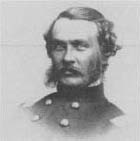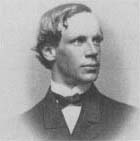
EUSTIS AND FARRAR
PROFESSOR HENRY LAWRENCE EUSTIS
Class of 1838
Colonel, 10th Massachusetts Volunteer Infantry.

Beyond Doubleday’s left, [Major General John Newton] found the ground to be “almost denuded of troops.…” Meade suggested that he ask Major General John Sedgwick, Sixth Corps commander, for units to fill the gap.… Eventually, the Sixth Corps brigades of Brigadier General A. T. A. Torbert and Colonel Henry L. Eustis extended the line.…
—JEFFRY D.WERT
HENRY WELD FARRAR
Class of 1861
Vol. A.D.C., staff of General Sedgwick, March, 1863; Second Lieutenant, 7th Maine Vols., 10 April, 1863.

As for the Sixth Corps, it had become the manpower pool of the army from which infantry units and artillery batteries were drawn and used to plug gaps or bolster weak places in the main Union line.
—EDWIN B. CODDINGTON
Good God, it was Professor Eustis. It couldn’t be Professor Eustis, but it was.
Otis halted his urgent scramble down the Taneytown Road, unsure what to pretend he was doing.
Professor Eustis was running directly toward him at the head of a great mass of men, three or four regiments, it looked like a whole brigade. The professor had always had a fierce and accusing eye. Otis blanched and shuddered and stopped breathing as it fell upon him now with a look that pierced him through, just as it had pierced him in the old days when a horribly distinguished trio of professors—James Russell Lowell, Evangelinus Apostolides Sophocles and Henry Lawrence Eustis—had officially “admonished” poor Otis and nearly thrown him out of school.
Luckily this was not the moment for another admonishing. Professor Eustis swept past Otis at the head of a column of eight or nine hundred men who were churning up the dust on the road and keeping their heads down, heading for another part of the line.
Breathing again, Otis kept going, but he was severely shaken. No longer could he persuade himself that he might just possibly have been entrusted with a vitally important dispatch from one commander to another. He was just another cowardly skulker heading south on the Taneytown Road.
And there was no cover, no handy little woodland to duck into when Henry Farrar appeared out of the smoke.
Otis had not seen Farrar since the Grand Opening Night of Hasty Pudding in March of 1860, when Otis’s playbill had promised “Talented Company! Gorgeous Scenery!! Magnificent Costumes!!! Utter Recklessness as to Pecuniary Considerations!!!!” and Henry Farrar had appeared in a frolicsome farce as Mr. Snoozle.
Now the hilarious Mr. Snoozle was in uniform, shouting at a battery commander who was trying to move his pieces from one part of the ridge to another. While Otis stood frozen and staring, a shell struck one of the horses. It staggered and fell, spilling its guts on the road. The other horse reared in its traces and the whole caboodle tipped over and fell in a smash of flailing legs and spinning wheels.
The captain of the battery seemed dazed. He stood sweating and staring while Farrar threw himself at the dead horse and grasped the harness. The men of the gun crew gaped at Farrar as his fingers struggled with the buckles, then came to their senses and began pulling at the other horse, heaving it up on its legs. At once a crowd of men from another battery massed around the gun and set it upright.
If Farrar had seen Otis, he was too busy to do anything about him, and now a heavy layer of sulfurous smoke drifted over the road, hiding the guns and the panting men and Second Lieutenant Henry Weld Farrar.
The blanket of smoke smelled of brimstone, but in the welcome cover Otis scrambled away from the Taneytown Road and dove into the woods. He had no idea where in the hell he was going, and even among the trees there was no safety from the hideous random fall of the rebel shell, but he wouldn’t run into anybody he knew. If he could make his way across lots and find a cozy shebang among the trees until nightfall, then maybe he could get away from this place entirely, without running into a provost guard eager to nab and put to death a habitual deserter like Otis Pike.
All would have been well—in fact he had just found a handy path through the wilderness—if another familiar face had not suddenly loomed at him out of the wreathing smoke.
Otis would have laughed if he hadn’t been nearly out of his wits with fright, because it was some kind of joke, the way this battle seemed to be the exclusive property of a bunch of Harvard men.
This one was staring straight at him only a few feet away. It was his idolized old friend and champion, First Lieutenant Seth Morgan. Seth had wandered away from the costly victory at Culp’s Hill into the solitude of the woods, careless of the fall of shot and shell. He was overcome by grief.
Otis carried in the pocket of his coat the scrap of paper that had been Seth’s kindly warning, written only a moment before the entire regiment had plunged over the breastworks into the deadly swale below Culp’s Hill—the entire regiment, that is, with the exception of Private Otis Pike.
Both Seth and Otis knew the penalty for a fourth desertion. He was to be shot on sight.